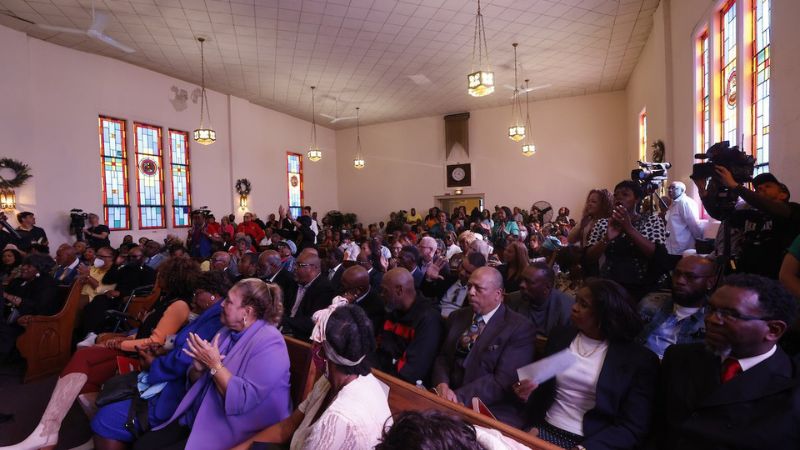Toward the end of his first week in office, new Chicago mayor Brandon Johnson attended a community celebration that felt more like a homecoming ceremony.
Organized by longtime U.S. Rep Danny K. Davis and others, the celebration honoring Johnson occurred Saturday afternoon at the New Life Holiness Church in Austin, the neighborhood where the mayor lives.
A choir sang soulful hymns, and prayers of supplication were offered on behalf of the 47-year-old first-time mayor. Guest speakers like Illinois Supreme Court Justice Joy Cunningham provided encouragement.
“I’m saying prayers for you every night because you have a big job ahead of you,” said Justice Cunningham. “But we all know that he’s up to the job.”
Later, a spoken word artist read a poem celebrating the mayor’s life.
But the people packed out the pews of the cozy Westside church to see Johnson — a preacher’s son and the Austin community’s son — up close and personal. And when he spoke, it was to address the enormous task ahead of him as the city’s 57th mayor and praise the side of town that is his home.
“People are rooting for Chicago because Chicago is the very place where liberation was born,” Johnson said, “And so our deep and profound history, particularly here on the Westside of Chicago, where Reverend Martin Luther King Jr. found his home, where Chairman Fred [Hampton] began to express how important it was for every single child to have access to food, and that healthcare is a human right.”
“That’s birthed right out of the Westside of the city of Chicago,” he said, which drew a bevy of applause and cheers from the audience.

Johnson also acknowledged the younger voters instrumental to his upset victory against Paul Vallas in the runoff election. He also hit every talking point of his platform, touching on public safety and healthcare access to job creation and affordable housing.
Johnson spoke about the energy and momentum needed from everyone, including his supporters, to make his campaign objectives a reality.
Take schools, for instance.
“This multicultural, multi-generational movement that has propelled the brother on the Westside to the fifth floor — know that that’s going to be the same energy that we’re going to need to ensure that we have fully-funded neighborhood schools,” he said.
At the end of his speech, Johnson took his critics to task about a fundamental idea that was always integral to his campaign — the need to empower people. Fittingly, he did so with the aplomb of a preacher.
“Now there are individuals that are getting all nervous because they believe that somehow investing in people is a radical idea,” he said. “Well, how about some good news?”
“If the message was strong enough for Jesus the Christ, then it’s strong enough for the city of Chicago,” he said.
“We are going to invest in people.”
